How to eat the question when someone asks "What's next?"—or anything else, for that matter.
An Ordinary Disaster — chapter 21 — Eat the Question
At nine am on the morning of March 5, 2015, I was standing outside the hangar of a small airstrip in Cloverdale, California, my few employees gathered around me. The hills were a lush spring green, and the day had begun clear and bright, the air still crisp but warming quickly in the sun. We all wore bulky maroon flight suits and four-point harnesses over our street clothes as we listened to the final words from the skydiving instructor. The briefing complete, we counted off in pairs, and two of us walked towards the plane for the first ride up. I could feel my phone in my pocket, and just then, before I climbed in, it vibrated silently with an alert.
I’d been waiting for an important message from my counter-party’s lead attorney, so as my right-hand man Rob and I paused and turned for a pre-flight photo, I pulled out my phone, opened my email, and with a few quick taps of my finger, made the last electronic signature that finalized the sale of my business. As the photographer’s shutter clicked away, the screen refreshed with a big green check mark. Gratified, elated, and excited to share the news—but not just yet—I folded myself through the door of the plane and settled in for the climb up to 12,000 feet.
Twelve minutes later, I was in free-fall. I’d started flying myself with paragliders the year before, and so I wasn’t totally unfamiliar with the feeling of being in the air, but skydiving is very different than free flight, and until that day, I hadn’t ever had the opportunity to jump out of a perfectly good airplane. It seemed like the perfect way to celebrate another successful conference—and the much bigger news that I’d soon be announcing to everyone else.
Here’s the thing though—even at 120mph, strapped to the front of a skydiving instructor, I was already thinking about the question that I knew would immediately follow my return to Earth.
I’d been working on selling the company for at least the past three years by this point, increasingly consumed with turning my little conference business into a well-oiled and well-documented machine—and I’d succeeded. Our events were more successful than ever, and at the same time I’d removed myself from daily operations enough that my acquirers had no problem with the fact that just two days later, I’d be disappearing over the horizon on another remote sailing trip, entirely off the grid and unreachable in the vast reaches between the remote atolls of the Marshall Islands.
The deal was done—and the ground was approaching rapidly. My pilot pulled the chute, and as he steered towards the landing, I readied myself for the question—and the related decision—that I anticipated with increasing anxiety. I knew that I as soon as we landed, or as soon as I told my staff that the sale was complete, and certainly as soon as I made that announcement more widely, I would be faced with the question of “what are you going to do now?”
This was the question I’d already been asked by some of the people that I’d been able to share the pending deal with. It was natural enough,and I understood their curiosity—but even thinking about the question made me grimace and shake my head, and I resented that I would be pressed for an answer, especially so soon after signing the contact.
Aside from skipping right past such an important moment, the question seemed to include the assumption that I somehow already had something else up my sleeve, as if I could have had the time or energy to figure out what that might be while I was doing everything had been required to get the company sold in the first place.
I certainly hadn’t.
After swooping back and forth a few times, we came in and flared for a gentle touchdown. The jump had been a rush, but the brief thrill ride was overshadowed by larger wheels turning in the background. I had just sold the business that I’d built myself, from scratch, over the past fifteen years! As much as I’d loved the experience of being an entrepreneur, I was overjoyed to have found a way to successfully hand the company over to an acquirer with a solid reputation—and, most of all, to be free of the whole thing myself. There’s more to tell at another time in the story of the business, but one thing that most folks don’t know or imagine about producing conferences as a business is that it’s like going back to play high-stakes poker, over and over again each time. You’re essentially “all in” with each event, and as soon as one is complete, you’re on to the next one. With a dozen or so major events each year, it’s a continuous cycle that is gratifying—and also exhausting and incredibly nerve-wracking.
Another problem with the impending question of what to do next was that much more than whatever I turned my attention to next, I was aching to finally have the opportunity to be someone other than the ‘conference guy’—so it wasn’t just that I had to figure out what to do. I had to figure out who I wanted to be—and how to become that person.
A good problem to have, sure, but now that I was back on the ground, this question was going to be impossible to avoid. My identity had been tied so tightly for so long to my business, and to being a business owner, that the logical next step would have been to start another business. I could see the possibility of that happening, and I certainly felt capable of it—but at a deeper level I felt exactly as Tim Krieder put it in I Wrote This Book Because I Love You: “We’ve all arrived at those moments when we look up from our lives and ask: Why am I this person I would rather not be? Where exactly did things go wrong?”
I gotta say, the “what next” question kindof just made me angry, because it poked at the truth beneath the surface. I had in many ways spent a lot of time being someone that I didn’t want to be—and that I still didn’t know who I did want to be. If I had known what next, then I would probably would have had a much better sense of what to do with myself in the first place, and I wouldn’t have ended up drifting into something so incredibly mundane—conferences, about advertising of all things—for so many long years.
Nevermind that I had actually had been able to dig myself out from that hole by doing what so few manage to do in selling the company—I still didn’t know myself well enough to know what to do next, and I could see how my perceived lack of direction could easily eclipse what I had only just accomplished.
Over the course of that morning, as the rest of my employees had their rides up to 12k and their free-fall back to the LZ, and then as we drove to the little wine-country town of Sonoma for a celebratory lunch, I began to realize just how much anxiety I had around decisions, and that I often found myself trying very hard to make a decision, feeling stuck, going back and forth, not knowing and frustrated to find myself facing, yet again, a version of the question that had vexed me since I was mid-teens: “who am I—and how could I not know?”
This might sound like nothing more than a very first-world problem that I should have perhaps considered myself fortunate enough to so-called suffer from, but I wasn’t so much tired of making decisions as I was tired of the feeling of not being able to make decisions, and this anxious cycle was part of my individual recipe for depression—trying to decide, and repeatedly re-experiencing that feeling of not knowing. The principle of neuropsychology that’s known as Hebb’s Law—“what fires together wires together”—describes how that by repeatedly traveling that path of not knowing, I was responding to, and then also reinforcing a pattern of thinking in which I was disconnected from myself, each repetition of which took me further away from any foundation of knowing, and also making it more likely that I ‘wouldn’t know’ again in the future.
I already knew that, somehow, I’d been practicing confusion for much of my life, and I’d always thought that the only way to unwind the knot of confusion was to think through a situation and decide. It became clear to me that morning that grinding away like this, trying to decide, often just resulted in a negative feedback loop of further confusion. I needed another way.
Setting myself the task of selling my business and achieving the result cemented a greater solidity and clarity in me. Over time, and also in the moments of the culminating result, I felt grounding effect of the accumulation of evidence that following the messages that I got from the deeper parts of my self did lead me in the right direction—when I managed to listen. It’s fair to say that I’d also earned a certain measure of freedom, not just by way of handing off the business to someone else, but because I’d earned some real money in the sale.
As we were seated in the restaurant for lunch, I got ready to tell the group what else I’d been up to while we were all jumping out of an plane that morning. By then, one thing I was clear on was that I wasn’t going to feel compelled to respond to anyone else’s question about my own future plans, and also that I wasn’t going to feel aimless or ashamed for not having an answer. I didn’t have an answer, but also, I wasn’t going to have “I don’t know” as my only answer, as had been the case so often in the past.
As with many other things along the way for me, the realization that I didn’t necessarily have to decide crystallized as one of those magic phrases that I’ve carried with me ever since.
The phrase that emerged: “Decide Nothing” would be my answer to “what next?”—and when those two words came together, they hit me in the chest with a flood of warm relief. Now, I’m certainly not the first person to get knocked upside the head with the idea that deciding might be not just a necessary pain in the ass but in fact just not really all that necessary. I’ve read Michael Singer’s The Surrender Experiment, as well as what Nassim Taleb sums up in Antifragile that “we are largely better at doing than we are at thinking,” but prior to getting this message myself, I hadn’t seen for myself the possibility of breaking out of the downward spiral of the endless decision loop.
Deciding can be exhausting, not much fun, and, very often, simply doesn’t work. There are plenty of folks who argue rather coherently that we don’t have much free will at all—that, as Sam Harris writes, “The intention to do one thing and not another does not originate in consciousness—rather, it appears in consciousness,” and so, no wonder that it causes us a lot of pain trying to insist on exercising our perhaps-imagined freedom to choose, or decide.
I had the chance to test out my brand-new axiom when I talked with an old friend the next morning. Just as I expected, he asked me exactly the question that I had been dreading—but that I was now ready for.
“So,” he said, “what are you going to do next, now that you’ve sold the business?”
“What’s next is I’m going exploring,” I replied. “And I’m not deciding anything for at least a year.”
From then onwards, and for quite some time, whenever I noticed the feeling of being stuck in decision-making, or even the feeling of a decision trying to get close to me, I would think of that phrase—“Decide Nothing”—and steer in the other direction. All of that feeling lost, anxious and confused, all of that spiraling down, leading me further and further into a desperate sense of no-self—those were symptoms that were trying to tell me that, by trying so hard to decide, and getting stuck there so often, I had ’let more important things remain unconscious.’ It was time to find out what those important things were, and I had to get comfortable with leaving space for that to emerge.
In just the following couple of years, I went on kitesurfing expeditions in the Marshall Islands, Micronesia, Brazil, Zanzibar, Cape Town, Maui, and the Philippines, upriver by ferry on the Amazon, paragliding in central Mexico, and trekking in the highlands of Tanzania and across the Lençóis Maranhenses, along with a lot of trail running right at home in the mountains of California. New friends in Brazil invited me to join them in making an adventure travel documentary, and to guide kitesurfing trips there—all of which I did while learning Brazilian Portuguese on the fly. Throughout this entire time I was also keeping up my commitment to the acquirer of the business I’d sold, and, in doing so, earned a million-dollar bonus payment that they delivered with their earnest congratulations.
All of this wasn’t ‘just travel,’ and of course I was at home quite a lot too, but I did find that I felt free in a new way to set off in whatever direction felt right, near or far, without much consideration to how or when I’d return. Sometimes I felt like going, and at other times I got the message to stay. I didn’t always read myself right, but I was learning to do so, and for me, movement is a big of how to do that, whether it’s the physical movement of outdoor sports or the larger-scale movement around the state, or the planet.
Instead of augering in on ”what next?,“ I’d begun to “eat the question”—to transform the question into a quest, not for the answer, but for what the question means. The answer, for the time being, turned out to be “nothing”—and doing that freed me to move away from who I had been, into the potential of who I could become—away from the black, and into the gold.
Thanks for reading, and for being part of this journey.
This is part of AN ORDINARY DISASTER, one man's proof that despite what may seem like our inability to hear it, and all of our attempts to avoid it, we can all learn to listen to ourselves, and to act upon the inner voice of our self, our sanity and our soul.
Further reading
Tim Kreider, I Wrote This Book Because I Love You
Nassim Nicholas Taleb, Antifragile: Things That Gain From Disorder
Sam Harris, Free Will
Harry A. Wilmer, Practical Jung: Nuts and Bolts of Jungian Psychotherapy
Here’s the table on contents for my memoir in progress. You might also enjoy some of my other writing on subjects mentioned here, such as:
What is Intuition? A Whole and Open Mind
What is intuition? There are so many ways of describing what’s often called intuition—and still it can remain hard to define, hard to reach, hard to hear, and hard to understand. Words wear out, and this old word that once meant something like “tutor, guardian, or ‘private teacher within
How I confused "discipline" with getting told what to do, and learned to love self-discipline
Growing up, I came to understand “discipline” either in the sense of punishment or as a macho ‘no pain no gain’ sort of thing—that if you were something like ‘man enough’ you’d have the discipline to get up early, work out, and, you know, do the right thing.
or any of the other essays that you can find here:
Eighteen essays about addiction, masculinity, creativity, and intuition
I recently divided my stack into sections—memoir, essays, mediations, and perhaps soon more—and in doing so I was reminded that I’ve put out no fewer than eighteen long form essays so far here, on topics ranging across anxiety, fitness, creativity, sobriety, self-discipline, purpose, love, adventure, sciatica, pain, AI, intuition, the collective unconsc…
I’ve got some questions for you
Have you ever felt compelled to know what’s next, without knowing the answer?
What’s your own relationship with intuition and how has that changed over time?
How do you feel about decision-making?
Have you ever started, run, owned, or sold a business?
What’s a favorite story from your own life—especially one that you’re a little bit afraid to tell?
Please share, comment, restack, recommend, and click the little ♡ heart right there 👇🏻 if you dig this piece. I’d love to hear from you!

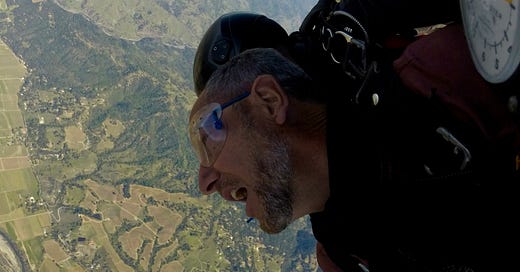



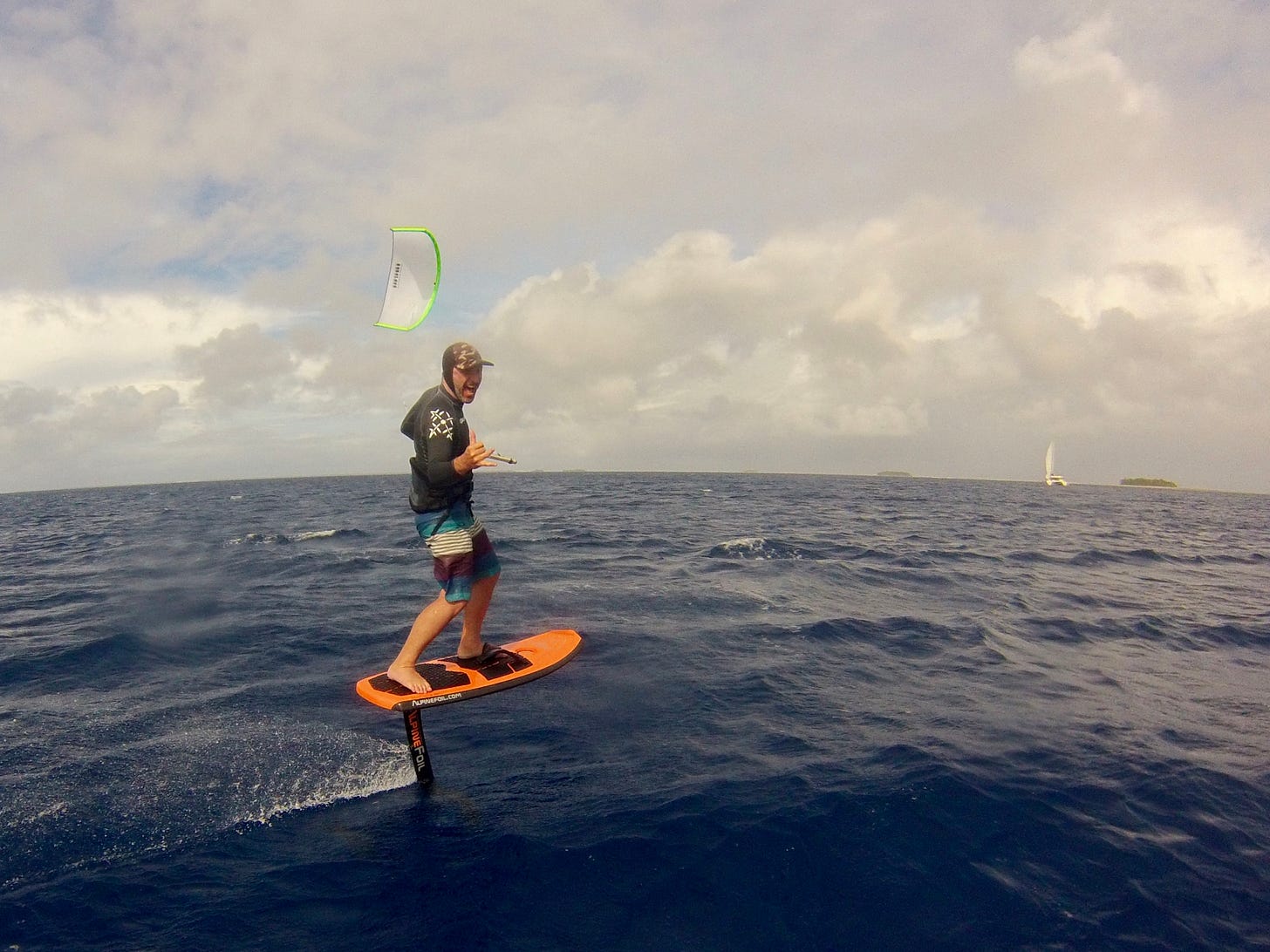
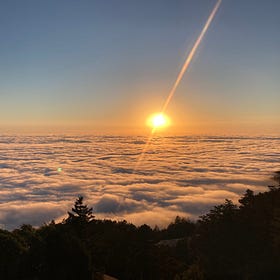
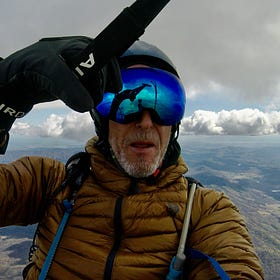
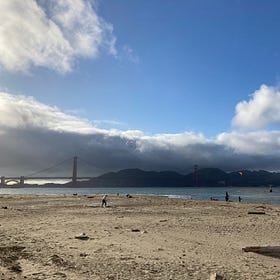
That endless confusion you spoke of really hit home for me. It's endlessly stressful.
Deep-down I feel I've always known that the decision itself barely matters, but that the 'doing-ness' of the thing itself is what's important. Putting aside the need to execute perfect choices, and being humble enough to forgive yourself to live with the effects of perhaps what wasn't the right direction to have gone down... and situation subsequently arrived at.
It can be so difficult to not tear oneself down for having done it all wrong, yet instead allow yourself to admit that simply doing it IS doing life itself.